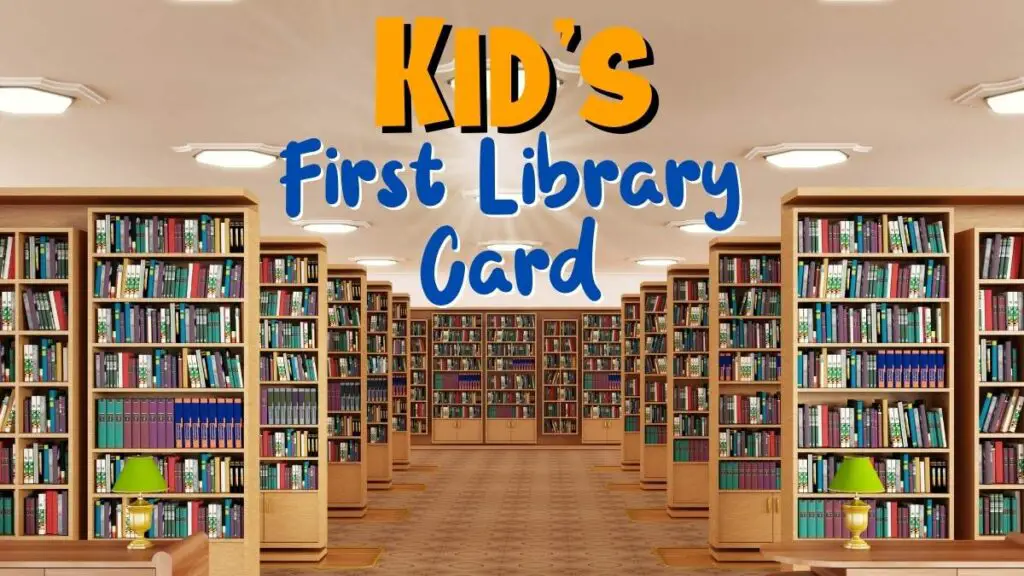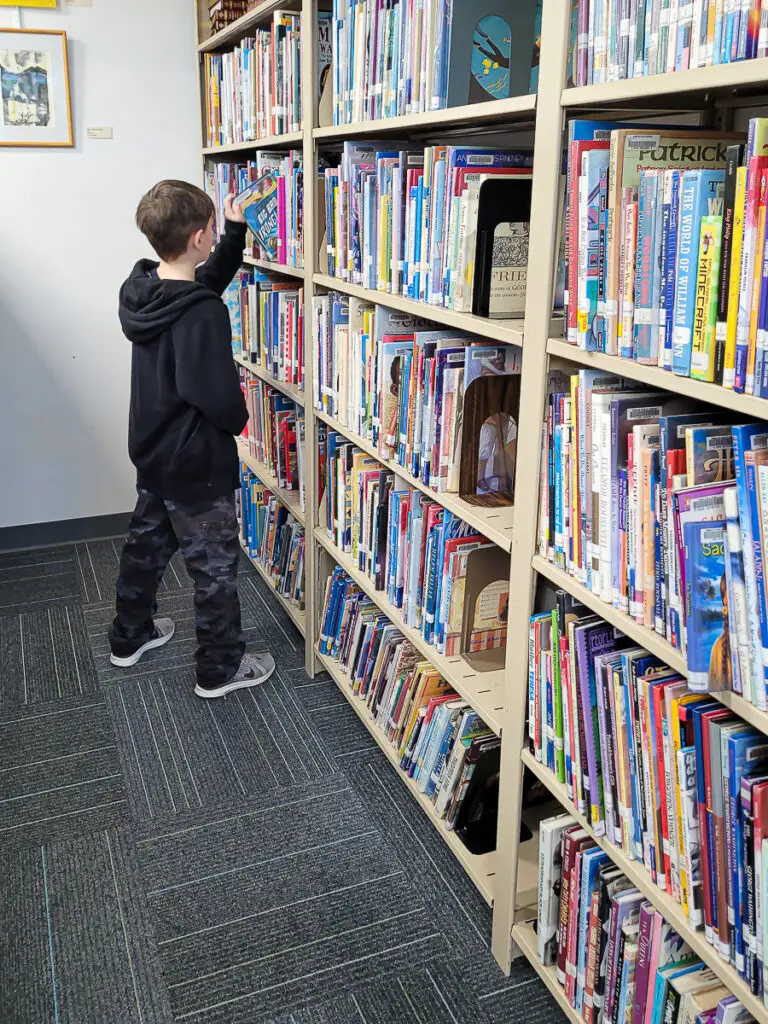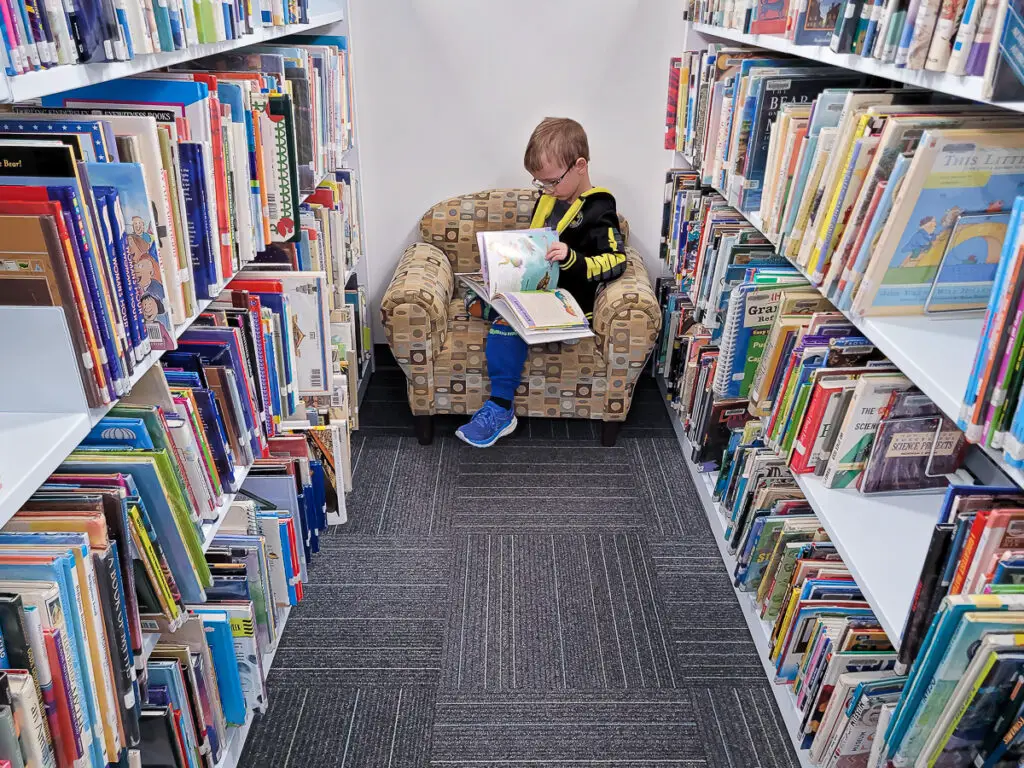Are you looking for a way to boost your child’s love of learning and reading? Check out your local library! Getting a library card for your child can open up a world of educational and recreational resources that can help to foster a lifelong love of books, knowledge, and learning.
From a wide range of books (including e-books and audiobooks), games or puzzles, and free or low-cost programs and events, your local library has something to offer children of all ages.
Learn how library cards for kids can foster a love of learning and provide access to resources and free programs. Get your child a library card and unlock the power of knowledge and imagination.

Libraries Provide Access to Resources
Having a library card provides children with access to a wide range of resources, including books, e-books, audiobooks, magazines, and educational videos and games. This can be done both physically, by borrowing them from the library, or digitally, by accessing the library’s online collection.
- Books: Libraries typically have a vast collection of books for children of all ages, interests, and reading levels. This can help children find books that they are interested in and are at the right level for them to read.
- E-books and audiobooks: Libraries also offer digital versions of books that can be accessed through a computer, tablet, or other electronic devices, this can be very useful for children who may have difficulty reading physical books, or for children who prefer to listen to stories instead of reading them.
- Other electronic resources: Many libraries have exclusive databases used to research educational topics, test preparation services, and live tutoring help for example. Availability depends on your library’s slate of subscriptions.
- Educational videos and games: Many libraries have educational videos and games that children can borrow or access online. These resources can be an engaging and interactive way to learn and explore new topics. For example, our kids often check out jigsaw puzzles; they do them a few times and we return them to check something else out.
- Magazines: Libraries often have a variety of magazines for children that cover a wide range of topics such as science, nature, and current events. These resources can help to further expand children’s interests and knowledge.
- Computers: Most libraries have computers that can be used not only to search the collection and look for library materials, but also to access the internet or do word processing. This can be huge for kids that do not have a computer at home.
- WiFi: Whether using a library computer or your own laptop, tablet, or phone, most libraries offer access to their wifi network. Kids can find a quiet space to do research or homework if they don’t have the space or quiet to focus at home.
- Events and Educational Programs: Our local library frequently hosts events such as story time, book clubs, movie screenings, and crafts. There are summer reading programs and events to keep kids engaged over summer vacation.
- Library Staff: Librarians are one of the library’s most valuable resources and are often overlooked. They can help find materials or request books from other libraries if it’s not available at your library location. Librarians can suggest related books to a favorite story or subject or listen to your interests and make recommendations on what to read next. (Pro tip: Most librarians love to discuss books and stories, and love to help connect people with books they’ll love.)
A library card teaches responsibility.
Libraries provide access to lots of cool stuff, but it’s not all about the resources. Having a library card can be a great way to start teaching children responsibility. Libraries offer physical items and digital materials that patrons can borrow or use. Checking out books requires children to make decisions and prioritize what they want to read (and sometimes they may have to wait for a favorite book.)
- Checking out and returning materials on time: When a child has a library card, they can borrow r materials from the library. This process requires them to be responsible for returning them on or before the due date. This can help children become accountable for the things they borrow and the importance of being organized enough to keep track of due dates. Yes, it’s still ultimately up to the parents, though presents a great opportunity for kids to take responsibility.
- Learning to take care of borrowed materials: When children borrow materials from the library, they are responsible for taking care of them. This can mean keeping the books and other materials in good condition, which can teach children the importance of taking care of things they borrow and ensuring they return them in good condition so the next person can enjoy them. No one likes checking out a torn up book with scribbles on the pages!
- Searching and finding materials: With a library card, children can access the library’s catalog and search for topics that interest them, or see if there are more stories from a favorite author. This process can help teach children how to find and organize information, as well as how to use library resources. Learning how data is organized is a valuable skill in our increasingly digital world!
- Developing a sense of ownership: When children have a library card, they have access to so many options. From all the options available, kids can make choices based on their own interests. Making their own decisions can help to develop a sense of ownership and responsibility for their own learning and reading.

A library card helps teach self-discipline and patience
Having a library card is an excellent way to help children develop self-discipline and patience. Public libraries offer an incredible number of reading options, while limiting the number of books that can be checked out at once and the number of copies available.
We’ve had a number of “teachable moments” when the next book in a given series was already checked out. Having the entire 1st grade read the first “Humphrey the Hamster” book together sparked a run on the rest of the series in every library in our geographic area.
Learning to wait for a desired book teaches delayed gratification, which is an important skill for children to learn. Getting a library card also teaches responsibility and accountability, as it requires them to return the books on time or face fines.
Libraries can save you money
Books can be expensive, and you can spend a small fortune building up a home library for kids. Checking out books from the library can provide kids with a nearly endless flow of books to read. As they finish one, they can check out another. If they want to reread something, they can check out a book as many times as they like.
Movies, music, and audiobooks can be the same. These can be borrowed instead of rented or purchased. We’ve entertained our kids many times with free events at the library!
What does a child need to get a library card?
Now that you know why every child should have a library card, how do kids get one? For younger kids, even though they may have their own card, they’ll need a parent or legal guardian to actually get the card. (You wouldn’t expect the average 5 year old to read and fill out the application, right?)
Specific requirements will vary depending on the library. In most cases, you can anticipate being asked for the following:
- Proof of current address: This may include a utility bill, lease agreement, or mail with the parent’s name and permanent address on it.
- Parent or guardian’s signature: Some libraries may require a parent or guardian to sign the library card application or registration form, especially for children under a certain age, or to confirm the child’s responsibility for the items borrowed
- Phone number or email address to contact the child or the parent/guardian in case of overdue materials or lost items.
It is best to check with your local library to find out their specific requirements for getting a library card. They may also have different requirements if a child wants to get a digital library card or a physical library card.
What age can a child get a library card?
The age at which a child can get a library card will vary, so check with your local library. Some libraries may require that children are a certain age, such as 5 or 6 years old ( Some libraries allow children of any age to get a library card as long as they are accompanied by a parent or guardian.
In most libraries, children are eligible for a library card when they reach the age of 5 or 6, and they can check out items under the supervision of their parents or guardians. Our local libraries had set the minimum age at 5 years old., and recently introduced a 0-5 card – so no excuses for not having a library card!
It is best to check with your local library to find out their specific policies regarding the age at which children can get a library card. Some libraries may also have special programs or services for younger children, such as story time or reading clubs, that can help to introduce them to the library and encourage them to develop a love of reading and learning.
How old do you have to be to get a library card without a parent?
The age at which a child can get a library card without a parent or guardian’s supervision can vary. Some libraries may require that children are a certain age, such as 13 or 14 years old, while others may allow children as young as 9 or 10 to get a library card without parental supervision. Check with your local library to find out their specific policies.
It is important to note that even if a library allows children to get a library card without a parent or guardian, they may still have restrictions on what materials they can check out, such as age-appropriate materials, or limits on the number of items that can be borrowed at a time. Additionally, the library card will be in the child’s name, but they will be responsible for any overdue fees or lost items, parents may be asked to sign a registration form to confirm the child’s responsibility.

Wrap Up – Library Cards for Children
Libraries provide children with the opportunity to discover new worlds. They provide access to books that may not be available in their home or school libraries, allowing them to explore different topics and genres.
Library cards are an invaluable resource for children, providing access to books, audiobooks, movies, music, and other materials that can help them learn and grow. By having a library card, kids can discover new worlds of knowledge and stories without spending a dime (well, unless you are late returning your items.) Library cards also provide access to online resources like databases and e-books.
Having a library card is an important part of growing up and developing a love for reading. Every child should have access to the vast resources available at their local library, and getting a library card is the first step in doing so.
Need some ideas for what to check out? We’ve got you covered with our book round ups and interesting reads! Dinosaurs and Robots are always a great place to start for kids, or some inspirational inventors to get them thinking. We’ve even got some STEM activities inspired by books!

